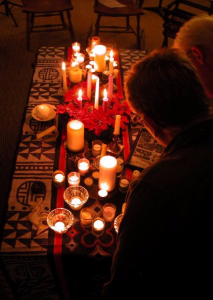In morning worship on Sunday, we listened to the pious protestations of King Ahaz, even as God offered the troubled king a sign of hope. We listened in as Joseph thought out loud about what do with a pregnant fiance carrying a child not of his own. In both cases, we learned that God got the final word. God came anyway.
As we have heard throughout Advent, the Lord IS come. The Lord will not be stopped, whatever we may be thinking or feeling. As real and legitimate as our sorrow is, the Lord IS come.
In a sermon to a church in Cuba in 1930, the great theologian Dietrich Bonhoeffer offered these words:
“We all come with different personal feelings to the Christmas festival. One comes with pure joy . . . . Others look for a moment of peace under the Christmas tree, peace from the pressures of daily work . . . . Others again approach Christmas with a great apprehension. It will be no festival of joy to them. Personal sorrow is painful especially on this day for those whose loneliness is deepened at Christmastime. Whether we wish it or not, whether we are sure or not, we must hear the words once again: Christ the Savior is here.”
Tomorrow night at 7, we hold a special service of worship and candlelight that acknowledges that Christmas brings mixed feelings for many. On what is the longest night of the year, the Winter solstace, we gather as a people unafraid to name our sorrow but equally confident that our faith connects us to hope, a hope that can’t be stopped. Henry Trexler will bring the word, a keen insight to shine a new light to push back the darkness.
So, whether you come for yourself or comeone else, whether your grief is personal or your concern is for our nation, I invite you to come to the Shelby Room Wednesday at 7 p.m. for a relaxed service of empathy, sympathy and comfort and stay for a cup of cider afterward as we take another step together toward the manger.
In Christ,
John

